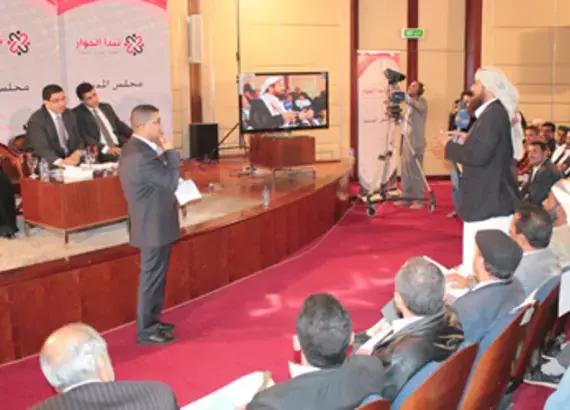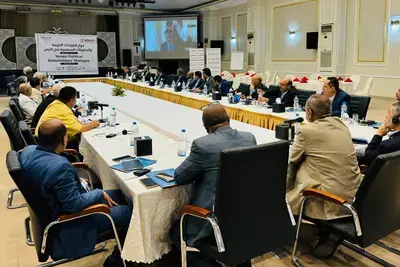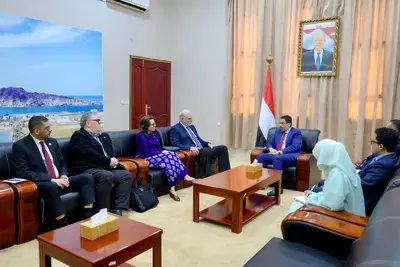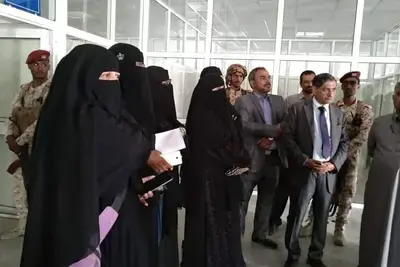
Success Story
Yemenis Flood Final Town Hall Meeting Before National Dialogue
Organizers had to scramble to find extra chairs for 340 Yemeni tribal sheikhs, governors, political party and civil society organization members, and journalists who turned out for the sixth televised town hall meeting to discuss Yemen’s highly anticipated National Dialogue Conference, which began last month. Despite an electricity outage caused by an attack on oil pipelines outside of Sana’a, the capital, participants flooded the March 13 meeting, originally arranged for just 230 people.
The dialogue is part of a two-year transition initiative led by the Gulf Cooperation Council (GCC), which began when then President Ali Abdullah Saleh agreed in November 2011 to hand over power to Abd Rabu Mansour Hadi, his vice president. Hadi was elected president in an uncontested race on Feb. 21, 2012, and charged with seeing Yemen through its transition. The process includes convening a six-month National Dialogue Conference to discuss how factions in the country can put differences aside, heal grievances and work together to develop a new government. The conference will be followed by a constitutional referendum and elections in 2014.
With significant tensions remaining between the north and south since they were unified in 1990 and widespread distrust in a centralized government, it has been difficult to gain support for the dialogue from major political parties and social factions. The conference was delayed from its original November 2012 start date to March.
NDI began convening town hall meetings last October to help citizens understand the political transition and to discuss what issues would be covered at the conference. The first five town hall meetings were held in Sana’a, Aden and Taiz and focused on the dialogue process, the economy, transitional justice and national reconciliation, the north-south relationship and women’s political participation. Subject matter specialists and conference organizers served as panelists and responded to questions from the audience. Town hall moderators also posed questions submitted through text messages and Facebook postings from viewers who watched the broadcasts live on Yemeni television. The meetings also were rebroadcast on local and international television stations.
The March town hall meeting focused on how the National Dialogue would operate, and how appointed dialogue delegates could get input from citizens on national issues.
Audience members, who reflected the mandated makeup of the conference - 50 percent from the South, 30 percent women and 20 percent youth - listened attentively as Ahmed Mubark, the secretary general of the National Dialogue Conference, explained the dialogue process. Mubark responded to audience questions, emphasizing the importance of the dialogue and encouraged the leaders of all social factions – especially the Southern Movement, a popular drive to give the South more autonomy – to participate in the conference.
Afrah Alzouba and Yaser Al Reeini, the two deputy secretaries general of the National Dialogue Conference, described how the National Dialogue's secretariat plans to share the progress of the conference with the public. A media department will report through press conferences, social media, interviews and the conference’s official website. It will also publicize citizen opinions submitted to the website and collected during public meetings. Attendees’ opinions ranged from condemning negative foreign influence to encouraging reparations to the South to criticism of the conference’s organizing committee.
At the end of the three-hour meeting, audience members rushed to the stage to ask the panelists more questions and continued conversations as they left the meeting hall.
The meeting was broadcast several times that evening and over the next four days. Additional town hall meetings are planned on specific topics to encourage citizen engagement in the transition process.
The meetings are funded through the U.S. Department of State’s Middle East Partnership Initiative (MEPI).
More information about the meetings is available on the event’s Facebook page. The broadcast of the March 13 meeting is available here.
Read more:
Published April 12, 2013



